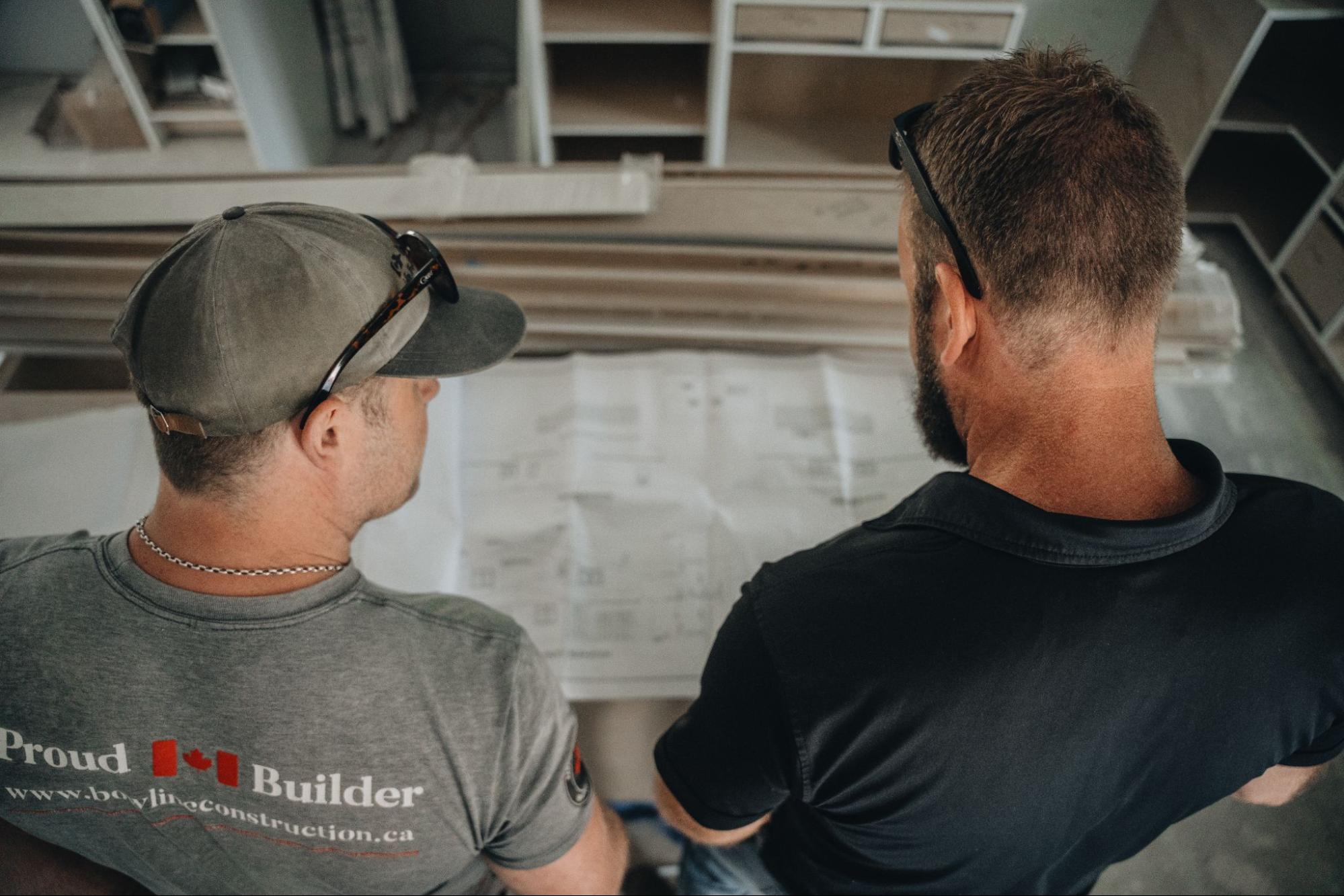

Fundamentals of Construction Project Management

How a construction project manager can elevate your business
While many construction companies have someone carrying the title of Project Manager, not every company has an actual project manager on their roster.
How is that possible?
The title does not the job make.
Unlike other project-oriented industries, which have very defined practices in place for project management, construction tends to approach this vital role in a way that’s far less… shall we say… regimented.
As a consequence, construction projects can quickly turn into 💩shows.
That’s why we’ve put together this overview explaining the main aspects of project management for construction contractors.
Discover what’s possible when you’ve got the right person doing the real job, supported by a proven system for success.
Why is *good* project management important?
Good project management can mean the difference between a thriving business or a stressful existence. The operative word here, though, is good.
The quality of the project management on your jobs has a massive impact on virtually every aspect of your business. Here are just a few benefits of an effective project management system:
- It puts time on your side – When your projects are well run, you finish them faster and can get started on new work. To put it another way: You scale through speed.
- It improves your bottom line – Smoother projects means you meet your construction budgets, which correlates to higher profit margins. Nuff said.
- It heightens your project quality – When the schedule is on track it leaves time to do proper checks and ensure everything is top-notch before delivering to the customer.
- It builds loyalty – Employees who feel like they’re working on stable projects don’t jump ship. A steady culture is a major job perk.
- It alleviates anxiety – You can be fully present when you’re with your family, confident your projects are all under control.
How to tell if bad PMing is affecting your business
There are a number of telltale signs that poor project management is having a negative impact on your business.
If you’re constantly dealing with any of the following issues, you may want to consider improving your project management system. Or implementing one, if you’re currently making do without!
- Your net profit margin has a negative sign in front of it.
- Your gross profit margin leaves a lot to be desired.
- Your projects always go over schedule.
- Nobody seems to have a clear picture of the project’s budget.
- Your blood pressure goes up every time you see a customer is calling.
- It only takes one little change order to throw the whole project off kilter.
What does a construction project manager do?
A construction project manager has two main responsibilities: to keep a project on SCHEDULE and within BUDGET. For them to do their job most effectively, they should be empowered to oversee both of these key elements of the project.
Differences between good and bad construction project managers
Unfortunately, not all project managers are created equal, so when you’re in the market for one, you want to make sure you find someone that understands the role and has the right temperament to excel at it.
These are some traits of a star construction project manager:
⭐ Analytical – they can break things down in a way that’s clear and comprehensible.
⭐ Problem-Solver – they’re resourceful and able to overcome obstacles.
⭐ Organized – if they don’t have an immediate answer, they know where to find it.
⭐ Aligned – their values match those of your company.
⭐ Tech-savvy – they know their way around project management platforms.
⭐ Personable – they can be trusted on the frontlines of dealing with customers.
Managing a construction job site vs. managing a construction project
It’s worth taking a brief moment to acknowledge the difference between site supervisors and project managers since these two terms sometimes get used interchangeably. Even though some of their tasks may have some crossover, they’re actually very different roles.
- A site supervisor is more in the “now” of a project, focused on the day-to-day, dealing with trades subcontractors and what’s happening on site. They will often provide updates or feedback to the project manager.
- A project manager is usually focused either just ahead of or just behind the current state of the project, concerned with preparing for work still to come or closing out work that’s completed.
While both roles are important to the functioning of a successful project, you probably don’t want the same person doing both, due to the discrepancy between where their focus will be in terms of the timeline of the project.
How to manage your project manager
It’s all well and good to have a project manager, but they’re only as good as you enable them to be. You should have two key things in place to best support your project manager to excel.
Employment Agreement
Providing your project manager with a well-defined employment agreement sets them up to do their best work. They’ll have clarity on what’s expected of them, know exactly what they’re responsible for and what they stand to gain if they deliver on their goals. It also plainly establishes the bounds of their responsibility, which may seem obvious, but you’d be amazed how often assumptions about that can wreak havoc on a project (not to mention your relationships with your staff).
Writing employment agreements from scratch can be tough so bypass the blank page with this Employment Agreement template designed specifically for project managers.

Accountability
Following on from the employment agreement, it’s worth having an accountability system to help hold your project manager to what’s been signed off on in the contract. The best tool we’ve seen for this is a Goal Setting & Review (GSR) dashboard. It helps keep project managers organized and helps you track the progress of their projects.
To learn more about the GSR system, you can check out this free web class. We’ve also developed a GSR template to get you started with implementing this powerful system.

How to effectively manage construction projects
Whether it involves residential or commercial construction projects, there are a couple core elements to consider. The project scopes may vary, but the management fundamentals remain the same.
Communication
Communication is an absolute foundation of any successful project. Part of setting your project manager up for success is giving them the tools they need to do the job right. A key element of that is providing them a strategy for maintaining regular contact with the project’s stakeholders.
By having a proactive plan that covers who they’ll communicate with, when and about what, it streamlines communications and keeps them from getting bogged down with calls from all directions.
Project Status Updates
As part of the communication plan, your project manager should be speaking with the customer regularly, ideally every week or two.
These meetings should include updates on:
- Where costs sit relative to the budget
- Whether the project is meeting its timeline
- Any pending or upcoming decisions the customer needs to make
If you’d like to nerd out further on the wonders of project management, we’ve wrapped these concepts – plus a few more – into a visually rich ebook. Download it here!
Pro Tips for Construction Project Management
We’ll leave you with a few final bits of advice from some of the most successful construction contractors we’ve worked with.
These tidbits come straight from the mouths of those who have lived these systems and earned massive profits because of them, so there’s earned wisdom behind these words.
- Before you go hunting for the project manager of your dreams, make sure you can afford one. (This is where having a financial tracking system helps!)
- Don’t just find any project manager. Find the right one for your company’s culture.
- Never assume your project manager knows where the boundaries of their role are.
- Visibility goes a long way. Use a system that allows anyone in your company to answer quick questions from the customer.
- Get vendor invoices into your tracking system as soon as possible so you always have an up-to-date picture of where the budget stands.
- Embrace tech. There’s no getting around it… projects run more smoothly with great platforms. Some of our favorites for construction companies include CompanyCam and Buildertrend.
Remember that every project is a building block for your construction business. It solidifies relationships with customers. It inspires your team members. It shows the world a better way to do things. Manage them right, and your projects will pay you back many times over.
Learn more about how streamlined business systems can lead to bigger growth and happier teams for your construction company.
Table of Contents










